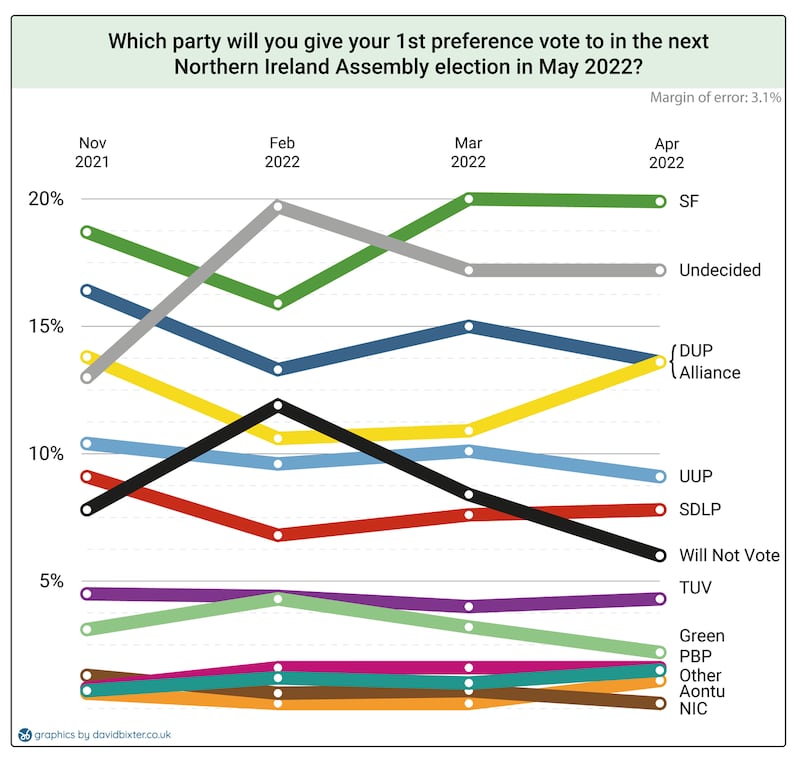SINN Féin has extended its lead over the DUP and is on target to emerge as the comfortable winner of Thursday’s assembly election, a fresh opinion poll forecasts.
Sir Jeffrey Donaldson’s party lags 6 percentage points behind its main nationalist rival and is neck-and-neck with Alliance on 18.2 per cent, according to the latest polling on behalf the Institute of Irish Studies-University of Liverpool/The Irish News.
The survey has Sinn Féin taking 26.6 per cent of first preference votes, reflecting a slight in dip in support compared to the last assembly election, but still leaving Michelle O’Neill clear favourite to be first minister.

The DUP has fallen back by 2 percentage points since last month’s corresponding poll, while Alliance has enjoyed a surge in support, which is likely to be augmented by its transfer-friendliness.
If the poll’s findings were repeated on Thursday, it would mean two out of every five people who gave the DUP a first preference vote in 2017 has switched allegiance.
Based on the responses of 1,270 people surveyed between April 16-26, the poll offers the most up to date assessment of the state of play with the parties days out from Thursday’s crunch election.

It suggests support for the Ulster Unionists has fallen back since the previous poll, with Doug Beattie’s party now sitting on 12.1 per cent, while the SDLP has seen a modest 0.2 point increase to 10.5 per cent.
The polling suggest support for Jim Allister's TUV has increased over recent months and now stands at 5.7 per cent, its highest showing yet in the Institute of Irish Studies-University of Liverpool/The Irish News series of polls.
Both the Greens and People Before Profit have enjoyed a boost in support compared to last month's corresponding poll, standing at 2.9 per cent and 2.1 per cent, respectively.

Professor Peter Shirlow of the Institute of Irish Studies-University of Liverpool said Sinn Féin looked on course to top the poll but the surge in the middle ground suggested significant electoral change.
"On Thursday we will see people elected by the slimmest of margins and for Sinn Féin and the DUP a potential challenge from Alliance, Greens, People Before Profit and independents, who may perform much better than previously," he said.
"In fact, if these parties can get close to 20 per cent of the overall vote then we are entering a new period in which constitutional-led politics is less attractive. If that is the case then the story of this election is the step away to parties which two decades ago could hardly must one-in-10 voters."
However, the Institute of Irish Studies director wouldn't rule out a "late rally" from the DUP.
"There are just a few days to go and they are pushing hard to mobilise voters to stretch beyond their concerns and vote," he said.

"Sinn Féin are running a low key campaign and presenting Michelle O’Neill a the first minister in waiting but no-one expects the combined Sinn Féin and DUP vote to be as high as 2017 – that in itself will speak volumes about a changing electorate."
:: The poll was conducted by Social Market Research Belfast and has a margin of error of 3.1+/-.








